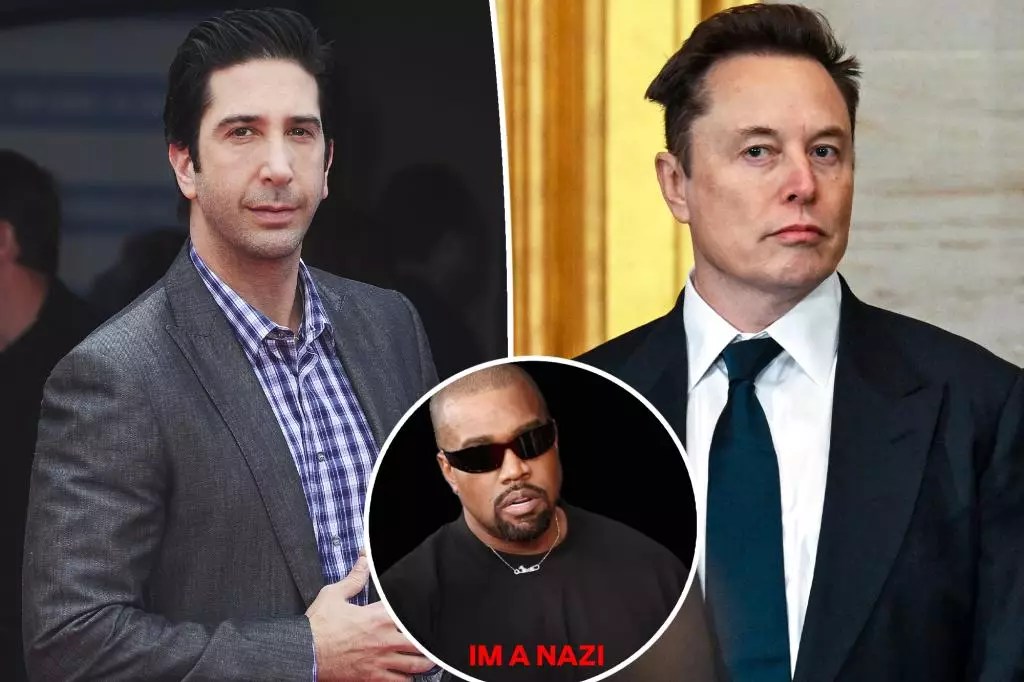The world has long been captivated by the complex relationships between celebrity culture, public discourse, and social media’s role in amplifying voices—both positive and negative. One of the latest incidents that bring this to the forefront is the ongoing exchange between actor David Schwimmer and rapper Kanye West, who goes by Ye. Schwimmer’s urgent call for social media responsibility and West’s alarming rhetoric have sparked controversy, illustrating a critical moment in the dialogue about hate speech, accountability, and the role platforms like X (formerly Twitter) play in shaping societal norms.
Celebrities resonate with vast audiences, and their words often carry significant weight. In this context, Schwimmer’s recent Instagram post condemning West’s inflammatory comments on Jewish people serves as a glaring example of this influence at work. Schwimmer, who is of Jewish descent, expressed concern not just for the Jewish community but for all marginalized groups, asserting, “Silence is complicity.” This statement underscores the importance of vocal opposition against hate speech, particularly when it is propagated by figures with substantial followings—West boasts over 32 million followers on X.
Schwimmer’s plea to Elon Musk, the owner of X, highlights a broader societal need for accountability from those who run social media platforms. By allowing West to maintain an influential presence after endorsing vehemently antisemitic views, Musk’s platform risks enabling not only individual harm but broader societal implications. The juxtaposition of Schwimmer’s moral stance against West’s provocations offers a clarion call for responsibility, demonstrated by the idea that allowing such voices to thrive may contribute to real-life violence against marginalized communities.
Kanye West’s recent comments extend far beyond casual social commentary; they are steeped in dangerous ideology and blatant hate. His tweets declaring himself a Nazi and espousing harmful stereotypes about Jewish people are not mere expressions of a controversial opinion—they perpetuate systemic prejudices that have long plagued societies. In a disturbing turn, West trivializes his abhorrent views by claiming innocence, asserting he owes no apologies for his statements on a historically marginalized group.
This rhetoric is particularly alarming coming from a popular celebrity, as it reinforces negative stereotypes and distorts public perception, impacting the way people view entire communities. By generalizing the entire Jewish population as deceitful or harmful based on personal biases, West not only emboldens antisemitism but also contradicts the essential tenets of societal coexistence. Such narratives can lead to an atmosphere conducive to violence and discrimination, making it imperative for influential figures to be challenged on their platforms and held accountable for the messages they disseminate.
The reality that West was previously banned from X for similar conduct heightens the urgency surrounding Schwimmer’s statements. What does it say about social media’s capacity to provide a safe environment when individuals can rehabilitate their online presence despite flagrant violations of guidelines against hate speech? The return of West to X, where he promptly ignited a new wave of outrage, raises critical questions about the enforcement of platform policies and the mechanisms through which hate can be quelled rather than enabled.
Moreover, as users of social media platforms, we grapple with our complicity in allowing certain voices to flourish unchecked. The phenomenon of ‘cancel culture’ complicates this further. It prompts discussions about whether ostracizing certain figures—or rather, holding them accountable—encourages a healthier public discourse, or whether it fosters a divisive culture that muffles dialogue entirely.
This episode reminds us that the fight against hate speech cannot solely depend on social media platforms or individual celebrities. It is a collective responsibility that must engage communities, educators, and leaders across various sectors. Only by fostering open dialogues, educated perspectives, and proactive measures can we address the societal ramifications of such incendiary speech effectively.
David Schwimmer’s urge for action against Kanye West serves as an important reminder that in a world increasingly influenced by the voices of celebrities, it is vital that we not only listen to what is said but also challenge hateful discourse. The narratives we choose to amplify ultimately shape our communities, and it is incumbent upon all of us to ensure they foster understanding rather than division.


Leave a Reply